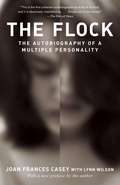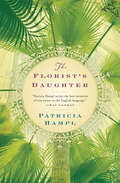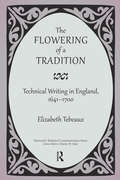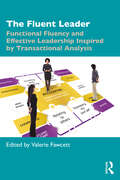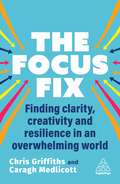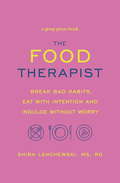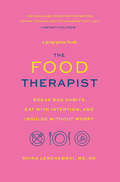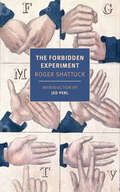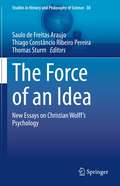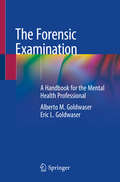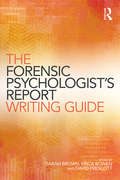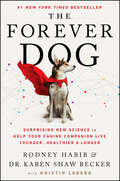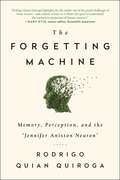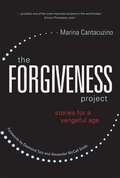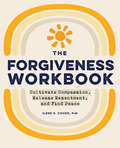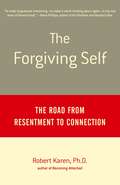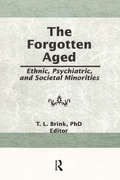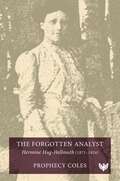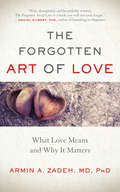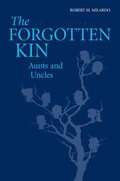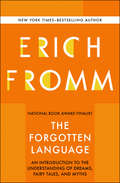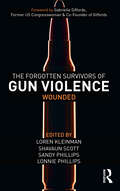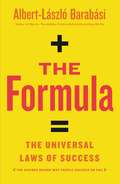- Table View
- List View
The Flock: The Autobiography of a Multiple Personality
by Joan Frances Casey Lynn WilsonThe groundbreaking first-person account of successful recovery from dissociative identity disorder, now featuring a new preface by the author When Joan Frances Casey, a married twenty-six-year-old graduate student, “awoke” on the ledge of a building ready to jump, it wasn’t the first time she couldn’t explain her whereabouts. Soon after, Lynn Wilson, an experienced psychiatric social worker, diagnosed Joan with multiple personality disorder. She prescribed a radical program of reparenting therapy to individually treat her patient’s twenty-four separate personalities. As Lynn came to know Joan’s distinct selves—Josie, the self-destructive toddler; Rusty, the motherless boy; Renee, the people pleaser—she uncovered a pattern of emotional and physical abuse that had nearly consumed a remarkable young woman. Praise for The Flock “A testimony to [Casey’s] courage and the dedication of her therapist, who believed that a profoundly fragmented self has the capacity to heal within a loving therapeutic relationship.”—The New York Times Book Review “Absolutely mesmerizing . . . the first coherent autobiographical study of its kind.”—The Detroit News “A compelling psychological odyssey offering unique insights into a nightmare world.”—Kirkus Reviews “Extraordinary . . . deftly told and studded with striking images.”—Publishers Weekly
The Florist's Daughter
by Patricia HamplThis New York Times Notable memoir of a middle-class, middle-America family is a &“beautiful bouquet of a book&” (Entertainment Weekly). They say &“a daughter is a daughter all her life,&” and no statement could be truer for Patricia Hampl. Born to a Czech father—an artistic florist—and a wary Irish mother, Hampl experienced a childhood in St. Paul, Minnesota, that couldn&’t have been more normal, the perfect example of a twentieth century middle-class, middle-American upbringing. But as she faces the death of her mother, Hampl reflects on the struggles her parents went through to provide that normal, boring existence, and her own struggles with fulfilling the role of dutiful daughter as she grew through the postwar years to the turbulent sixties and couldn&’t help wanting to rebel against the notion of a &“relentlessly modest life.&” Named a Chicago Tribune Best Book of the Year, The Florist&’s Daughter is Hampl&’s most extraordinary work to date—a &“quietly stunning&” reminiscence of a Midwestern girlhood, and a reflection on what it means to be a daughter (People).
The Flowering of a Tradition: Technical Writing in England, 1641-1700 (Baywood's Technical Communications)
by Elizabeth TebeauxThe Flowering of a Tradition, which describes the development of technical, or practical, writing in England during the seventeenth century, from 1641 to 1700, follows Emergence of a Tradition, which tracks the emergence of English technical writing from 1475 to 1640, during the English Renaissance. Together, the books present the emergence and development of technical writing in England from 1475 to 1700 by describing and exemplifying the main characteristics and genres of technical writing as they appeared and flowered. Topics include format and page design; recognition of readers' needs in content and presentation; plain style; technical description; technical writing's contribution to the development of the paragraph; text and the use of technology in technical writing; the history of instructions; and the emergence and development of proposals and reports. The two books cover the major topics that continue to form the foundation of the teaching and practice of technical writing and help define the history of practical discourse during approximately 300 years of English history. The history of technical, or practical, writing has not yet been written, and these two books fill a major deficiency in the history of English technical writing. Chapters on the history of the proposal and the history of reports deal with topics never before researched. The chapter on the history of the paragraph shows that paragraphs existed 300 years before composition historians have stated, because technical writing has not been included in studies of the history of English discourse. Even though the majority of English writing is practical writing in any era, it continues to be ignored by social and literary historians. Only book-length studies of the type published here will fill this void. Technical writing will not become a discipline unless we have a series of books providing a clear foundation that unearths its existence and shows its contribution to all of our writing today, in the workplace and other nonacademic settings.
The Fluent Leader: Functional Fluency and Effective Leadership Inspired By Transactional Analysis
by Valerie FawcettIn this insightful and comprehensive volume, leaders and managers can explore how they can use their power and choice of behavioural options more effectively to develop a positive and healthy working environment where people and the organization can succeed. Based on the Functional Fluency model as it was developed by Dr Susannah Temple, this book details the art and skill of interpersonal effectiveness, describing the behaviours that enable human beings to get along well together and to flourish and thrive. Fluent leaders make positive and flexible responses which help things turn out well, instead of repeating old automatic reactions that sometimes make things worse. By inspiring and motivating others, they manage and lead constructively, saving time, energy, and stress. Further, becoming functionally fluent will improve their problem-solving, decision-making, and communication skills, enabling them to cultivate successful relationships. Through engaging case studies and opportunities for personal reflection, The Fluent Leader addresses situations leaders face as managers, team leaders, senior executives, and change agents. The Fluent Leader guides leaders and managers, at all levels in any kind of organization, in how to use the most effective behaviours, and how to change ineffective behaviours, which are draining them or holding them back.
The Focus Fix: Finding Clarity, Creativity and Resilience in an Overwhelming World
by Chris Griffiths Caragh MedlicottWith focus and a clear mind, we can achieve almost anything. But we are constantly subjected to a deluge of distractions, from endless notification pings to anxiety and self-doubt.The Focus Fix explores how you can reset your mindset in order to reclaim your focus and achieve incredible results. In this fascinating book, leading creativity expert Chris Griffiths and journalist Caragh Medlicott unearth scientific studies and inspiring case studies to offer practical and proven techniques that will allow you to dispel distractions and maintain your focus.This book also uncovers the numerous benefits of sustained focus: you can achieve more by doing less, improve your mental wellbeing and boost your creativity. Don't get distracted - maximize your potential and discover the antidote to burnout with The Focus Fix.
The Food Therapist: Break Bad Habits, Eat with Intention and Indulge Without Worry
by Shira Lenchewski'If anyone can help us break our longstanding bad eating habits, it's Shira' GWYNETH PALTROW'The Food Therapist is a must-read for anyone who wants to change their eating habits but can't seem to make the shift. Shira makes it relatable and totally doable' LAUREN CONRAD We've all been there. We treat ourselves to some decadent dessert but don't take the time to enjoy it, and then quickly kick ourselves for it. Or we go on a super restrictive diet to only feel incredibly guilt-ridden after splurging on something we shouldn't have. When it comes to food, we are our own biggest critics, and this relationship can become very complicated.In THE FOOD THERAPIST, popular nutritionist Shira Lenchewski, reveals the root cause of our emotional hang-ups around food and our bodies in order to make conscious eating and lifestyle choices that serve achievable goals. Filled with unintimidating, nonjudgmental, and easy-to-execute practices as well as food hacks and simple meal plans, THE FOOD THERAPIST will change your relationship with food into a positive one.
The Food Therapist: Break Bad Habits, Eat with Intention, and Indulge Without Worry
by Shira LenchewskiIf you asked people to post a status update on their relationship with food, most would say "It's Complicated." We aspire to eat healthfully but find ourselves making hasty food choices driven by stress and convenience. Or we treat ourselves to a decadent dessert but feel so guilty we don't even enjoy it. The truth is we can't make good food decisions if we don't deeply examine our relationship with food.In THE FOOD THERAPIST, Shira Lenchewski offers readers an ongoing one-on-one food therapy session, revealing the root causes of our emotional hang-ups around food and providing the necessary tools to overcome them. This practical and judgment-free guide helps readers hone the skills needed to put their get-healthy intentions into daily action, such as planning ahead wisely, tuning into their fullness cues, and harnessing willpower (even when life gets messy).Lenchewski also offers easy-to-follow, tasty recipes aimed at rebalancing our hormones and conquering our cravings without deprivation. THE FOOD THERAPIST is a refreshingly modern resource that helps us finally un-complicate our relationship with food and our bodies. We can then focus our efforts on making thoughtful, healthy choices, day in and day out, which serve our ultimate goals, whatever they may be.
The Forbidden Experiment: The Story of the Wild Boy of Aveyron
by Roger ShattuckThe true story of the nineteenth century&’s so-called &“Wild Boy of Aveyron&”—an abandoned French child who lived for years alone in the wilderness before being brought under the care of an innovative young physician.&“Before dawn on January 9, 1800, a remarkable creature came out of the woods near the village of Saint-Sernin in southern France.&” So begins Roger Shattuck&’s book about the so-called Wild Boy of Aveyron—a child abandoned by his caretakers and captured, years later, while scavenging food from a garden. Unable to speak, he was sent to the National Institute for the Deaf in Paris, declared a hopeless case, and left to languish.One day, however, Jean Itard, a young medical student from the provinces, took notice of the boy. Itard began to spend time with him, and soon the two found ways to interact. With games and toys Itard engaged the boy's senses and imagination, developing methods of education (some of which went on to form a basis for special education and the Montessory method) that brought him out further. For a while Victor—as Itard named him—made progress, but soon it stalled. Isolated behind institutional walls, the boy lived out the rest of his life a stone's throw from the Luxembourg Gardens.The Forbidden Experiment tells the story of a tragic young man and the extraordinary doctor who tried, however imperfectly, to help him. It is a story of compassion, like the case studies of Oliver Sacks—a figure whom Itard foreshadows. It is also a story that leads Shattuck to ask deep questions about the human animal: What is language, how do we acquire it, and what do we become if we are deprived of it?
The Force
by Stuart WildeIn this book, Stuart Wilde explains that the Force is a part of each and every thing in the physical plane. This includes our planet, the stars and galaxies, and the physical universe . . . as it stretches out into space, beyond our perception. By its very nature the Force is immortal and never-ending. Because it is the inner light or "livingness" within all things, we call it universal.
The Force of an Idea: New Essays on Christian Wolff's Psychology (Studies in History and Philosophy of Science #50)
by Thomas Sturm Saulo de Freitas Araujo Thiago Constâncio Ribeiro PereiraThis book presents, for the first time in English, a comprehensive anthology of essays on Christian Wolff's psychology written by leading international scholars. Christian Wolff is one of the towering figures in 18th-century Western thought. In the last decades, the publication of Wolff's Gesammelte Werke by Jean École and collaborators has aroused new interest in his ideas, but the meaning, scope, and impact of his psychological program have remained open to close and comprehensive analysis and discussion. That is what this volume aims to do. This is the first volume in English completely devoted to Wolff's efforts to systematize empirical and rational psychology, against the background of his understanding of scientific method in metaphysics. Wolff thereby paved the way to the very idea of a scientific psychology. The book is divided into two parts. The first one covers the theoretical and historical meaning and scope of Wolff's psychology, both in its internal structure and in its relation to other parts of his philosophical system, such as logic, cosmology, aesthetics, or practical philosophy. The second part deals with the reception and impact of Wolff's psychology, starting with early reactions from his disciples and opponents, and moving on to Kant, Hegel, and Wundt. The Force of an Idea: New Essays on Christian Wolff's Psychology shows not only that Wolff's psychological ideas have been misinterpreted, but also that they are historically more significant than traditional wisdom has it. The book, therefore, will be of interest to historians and philosophers of science, historians of philosophy and psychology, as well as to philosophers and psychologists interested in understanding the roots of scientific psychology in 18th and 19th century German philosophy.
The Forensic Examination: A Handbook for the Mental Health Professional
by Alberto M. Goldwaser Eric L. GoldwaserThis book prepares the mental health professional to use scientific skills when working within a legal framework. Written by a seasoned forensic psychiatrist with decades of experience and professional honors, this text answers some of the most challenging questions psychiatrists face when mental health intersects with the courtroom. The text is supported with 34 case vignettes that demonstrate ways in which seemingly simple diagnoses have unique layers of complexities that are vital within the legal system. The resource covers topics that may not be elucidated in medical schools, including what to expect from an expert witness, how to communicate with attorneys who lack a medical background, managing opposing viewpoints, psychiatric and medical malpractice, harassment, employment status, and other difficult topics as it pertains to the law. The text also knits this understanding of forensic psychiatry with clinical knowledge, addressing violence and risk assessment, discrimination, disability evaluation, psychiatric disorders, criminal and civil competence, end-of-life care and decisions, and a wide array of medical topics that have unique concerns when placed in the context of the legal system.The Forensic Examination is a vital resource for psychiatrists, psychologists, criminal and civil defenders, and all professionals working with persons in the medicolegal system.
The Forensic Psychologist's Report Writing Guide
by Erica Bowen Sarah Brown David PrescottThe Forensic Psychologist’s Reporting Writing Guide is the first book to provide both student trainees and practitioners with best practice guidance for one of the core skills of their role. Written and edited by an international range of experts from the UK, North America and Australasia, it provides clear advice on a range of assessments, from psychometric tests to personality functioning, and includes real-life examples to illustrate key points. Uniquely, the book also offers guidance on the range of different client groups that forensic psychologists work with across both civil and legal contexts, including juveniles, female clients, couples and those with cognitive impairments. From core principles to writing style to key issues, each chapter also includes a checklist of advice and further reading. Comprehensive and practical, The Forensic Psychologist’s Reporting Writing Guide is a user-friendly companion to this critical and often overlooked skill, and will be essential reading for both neophyte and experienced forensic psychologists alike.
The Forever Dog: Surprising New Science to Help Your Canine Companion Live Younger, Healthier, and Longer
by Rodney Habib Karen Shaw Becker#1 New York Times BestsellerIn this pathbreaking guide, two of the world’s most popular and trusted pet care advocates reveal new science to teach us how to delay aging and provide a long, happy, healthy life for our canine companions.Like their human counterparts, dogs have been getting sicker and dying prematurely over the past few decades. Why? Scientists are beginning to understand that the chronic diseases afflicting humans—cancer, obesity, diabetes, organ degeneration, and autoimmune disorders—also beset canines. As a result, our beloved companions are vexed with preventable health problems throughout much of their lives and suffer shorter life spans. Because our pets can’t make health and lifestyle decisions for themselves, it’s up to pet parents to make smart, science-backed choices for lasting vitality and health. The Forever Dog gives us the practical, proven tools to protect our loyal four-legged companions. Rodney Habib and Karen Becker, DVM, globetrotted (pre-pandemic) to galvanize the best wisdom from top geneticists, microbiologists, and longevity researchers; they also interviewed people whose dogs have lived into their 20s and even 30s. The result is this unprecedented and comprehensive guide, filled with surprising information, invaluable advice, and inspiring stories about dogs and the people who love them.The Forever Dog prescriptive plan focuses on diet and nutrition, movement, environmental exposures, and stress reduction, and can be tailored to the genetic predisposition of particular breeds or mixes. The authors discuss various types of food—including what the commercial manufacturers don’t want us to know—and offer recipes, easy solutions, and tips for making sure our dogs obtain the nutrients they need. Habib and Dr. Becker also explore how external factors we often don’t think about can greatly affect a dog’s overall health and wellbeing, from everyday insults to the body and its physiology, to the role our own lifestyles and our vets’ choices play. Indeed, the health equation works both ways and can travel “up the leash.”Medical breakthroughs have expanded our choices for canine health—if you know what they are. This definitive dog-care guide empowers us with the knowledge we need to make wise choices, and to keep our dogs healthy and happy for years to come.
The Forgetting Machine: Memory, Perception, and the Jennifer Aniston Neuron
by Rodrigo Quian QuirogaIf we lose our memories, are we still ourselves? Is identity merely a collection of electrical impulses? What separates us from animals, or from computers? From Plato to Westworld, these questions have fascinated and befuddled philosophers, artists, and scientists for centuries. In The Forgetting Machine, neuroscientist Rodrigo Quian Quiroga explains how the mechanics of memory illuminates these discussions, with implications for everything from understanding Alzheimer's disease to the technology of Artificial Intelligence. You'll also learn about the research behind what Quian Quiroga coined "Jennifer Aniston Neurons," cells in the human brain that are responsible for representing specific concepts, such as recognizing a certain celebrity's face. The discovery of these neurons opens new windows into the workings of human memory. In this accessible, fascinating look at the science of remembering, discover how we turn perceptions into memories, how language shapes our experiences, and the crucial role forgetting plays in human recollection. You'll see how electricity, chemistry, and abstraction combine to form something more than the human brain, the human mind. And you'll gain surprising insight into what our brains can tell us about who we are. The Forgetting Machine takes us on a journey through science and science fiction, philosophy and identity, using what we know about how we remember (and forget) to explore the very roots of what makes us human.
The Forgiveness Project: Stories for a Vengeful Age
by Alexander Mccall Smith Marina Cantacuzino Archbishop Emeritus Desmond TutuWhat is forgiveness? Are some acts unforgivable? Can forgiveness take the place of revenge? Powerful real-life stories from survivors and perpetrators of crime and violence reveal the true impact of forgiveness on ordinary people worldwide. Exploring forgiveness as an alternative to resentment or retaliation, the storytellers give an honest, moving account of their experiences and what part forgiveness has played in their lives. Despite extreme circumstances, their stories open the door to a society without revenge. All royalties from the sale of this book go to The Forgiveness Project charity.
The Forgiveness Workbook: Cultivate Compassion, Release Resentment, and Find Peace
by Ilene S. Cohen PhDLet go and learn to forgive Forgiveness doesn't mean forgetting what happened or returning to the way things were before: it means choosing to release resentment and live a freer, happier life. For anyone seeking a starting point on the path to forgiving themselves or someone else, The Forgiveness Workbook can light the way. This simple and straightforward guide gets right to the heart of what forgiveness means and why it can feel so hard to do. Explore all the ways that practicing empathy and forgiveness encourages healing and growth, with activities, quizzes, and guided prompts that offer support for every step of the process. Go deeper than other personal growth books with: Six steps to moving on—Find a road map of what to expect along the journey, with chapters that clearly break down the six stages of forgiveness. Focus on self-empowerment—Learn how a willingness to forgive helps build resilience, healthier relationships, and a stronger sense of self. The science of forgiveness—Understand what happens in the brain and body when you hold in negative feelings—and the benefits of leaving them behind. Find strategies for releasing blame and moving on with The Forgiveness Workbook.
The Forgiving Self: The Road from Resentment to Connection
by Robert KarenWhy do we harden our hearts, even against those we want to love? Why do we find it so hard to admit being wrong? Why are the worst grudges the ones we hold against ourselves? Using movies, people in the news, and sessions from his practice, psychologist and award- winning author Robert Karen illuminates the struggle between our wish to repair our relationships on one side and our tendency to see ourselves as victims who want revenge on the other.When we nurse our resentments, Karen says, we are acting from an insecure aspect of the self that harbors unresolved pain from childhood. But we also have a forgiving self which is not compliant or fake, but rather the strongest, most loving part of who we are. Through it, we are able to voice anger without doing damage, to acknowledge our own part in what has gone wrong, to see the flaws in ourselves and others as part of our humanity. Karen demonstrates how we can move beyond our feelings of being wronged without betraying our legitimate anger and need for repair. The forgiving self, when we are able to locate it, brings relief from compulsive self-hatred and bitterness, and allows for a re-emergence of love.From the Trade Paperback edition.
The Forgotten Aged: Ethnic, Psychiatric, and Societal Minorities
by T.L. BrinkThis helpful book explores mental health issues relating to elders who do not fit into the “usual” mold for research--white, married or widowed, urban or suburban persons with adult children. The Forgotten Aged focuses on those groups of elders often overlooked in gerontological literature--elder African-Americans, rural aged, gay and lesbian aged, parents of developmentally disabled offspring, older developmentally disabled persons themselves, and “orphan” elders (those who do not have close family members who can serve as caretakers). The book offers “how to” advice on issues such as outreach, intervention, residential placement and transition, assessment, psychotherapy, and team building to help readers learn effective ways of helping elderly persons from these various groups. With an optimistic tone, it explores how more attention and resources, combined with flexible modifications of programs and practices, can yield favorable results for everyone involved. In The Forgotten Aged, authors examine a variety of pertinent topics including: assessment of dementia and depression in African-Americans multidisciplinary team outreach to elderly living in rural areas therapeutic issues with gay and lesbian aged residential transitions for developmentally disabled elderly helping aging parents of developmentally disabled offspring intervention with “orphan” elderly with Alzheimer’s diseaseSocial workers, psychologists, psychiatrists, geriatricians, nurses, and counselors involved in providing support and care for elderly persons will find The Forgotten Aged a useful guide in their daily work and decisionmaking. This book can also serve as an enlightening supplementary text in courses that study aging and the elderly.
The Forgotten Analyst: Hermine Hug-Hellmuth (1871-1924)
by Prophecy ColesHermine Hug-Hellmuth was an extremely gifted and intelligent woman, with a poetic mind that had been influenced by the German Romantic Movement. Her untimely murder at the age of fifty-four by her illegitimately born nephew Rolph has cast a shadow over her reputation. Her original contribution to understanding the mind of the child, her fine appreciation of the psychological suffering of the illegitimate child, and her challenge to Freud's theory about female sexuality has been largely ignored in order to save the reputation of the history of psychoanalysis. Her murder needs to be understood against the backdrop of the many tragedies she suffered. She lost her mother, Ludovika, when she was twelve, and her father, Hugo, deceived her over her illegitimately born half-sister Antonia. Hermine felt deeply unloved and could never trust anyone to get close to her. When Antonia died, leaving behind her nine-year-old illegitimately born son Rolph, Hermine was faced again with the stigma of illegitimacy and her father's lie about Antonia. She was further humiliated by Antonia's stipulation in her will that Rolph was not to be cared for by Hermine. The sisters had fallen out over Hermine's analysis with self-styled psychoanalyst Isidor Sadger, who disliked Antonia, and Hermine publishing extensive observations about Rolph and his sexual behaviour. Rolph was a troubled child and his disrupted upbringing after his mother's death was compounded by Hermine's ambivalent behaviour towards him. In the end, her father's lie, Antonia's will, and the behaviour of her delinquent nephew rebounded upon her and the intergenerational trauma achieved its nemesis in her murder. Prophecy Coles brings new insights to the life of the first child psychoanalyst. She reveals Hug-Hellmuth to be a woman before her time in her profound understanding of children, women's sexuality and desires, the impact of a mother's state of mind upon inter-uterine life, and the concept of "motherese", the universal pre-verbal language of mothers and their newborn babies. Coles exposes Hug-Hellmuth's genius, her flaws, and her inadequate care of her troubled nephew to create a rounded picture of a brilliant woman trying to find her own path while struggling with her own demons and the constraints of the time.
The Forgotten Art of Love: What Love Means and Why It Matters
by Armin A. ZadehExplore the many facets of our most valued emotion Cardiologist and professor Armin Zadeh revisits psychologist Erich Fromm’s The Art of Loving, a book that has fascinated him for decades. The Forgotten Art of Love examines love in its complex entirety — through the lenses of biology, philosophy, history, religion, sociology, and economics — to fill in critical voids in Fromm’s classic work and to provide a contemporary understanding of love. This unique and wide-ranging book looks at love’s crucial role in every aspect of human existence, exploring what love has to do with sex, spirituality, society, and the meaning of life; different kinds of love (for our children, for our neighbors); and whether love is a matter of luck or an art that can be mastered. Dr. Zadeh provides a fascinating, empowering guide to enhancing relationships and happiness — concluding with a provocative vision for firmly anchoring love in our society.
The Forgotten Kin: Aunts and Uncles
by Robert M. MilardoAlthough much is written about contemporary families, the focus is typically limited to marriage and parenting. In this path-breaking assessment of families, sociologist Robert M. Milardo demonstrates how aunts and uncles contribute to the daily lives of parents and their children. Aunts and uncles complement the work of parents, sometimes act as second parents, and sometimes form entirely unique brands of intimacy grounded in a lifetime of shared experiences. The Forgotten Kin explores how aunts and uncles support parents, buffer the relationships of parents and children, act as family historians, and develop lifelong friendships with parents and their children. This is the first comprehensive study of its kind, detailing the routine activities of aunts and uncles, the features of families that encourage closeness, how aunts and uncles go about mentoring nieces and nephews, and how adults are mentored by the very children for whom they are responsible. This book aims to change the public discourse on families and the involvement of the forgotten kin across generations and households.
The Forgotten Language: An Introduction to the Understanding of Dreams, Fairy Tales, and Myths
by Erich FrommRenowned psychoanalyst Erich Fromm investigates the universal language of symbols, expressed through dream and myths, and how it illuminates our humanity. In this study, Erich Fromm opens up the world of symbolic language, &“the one foreign language that each of us must learn.&” Understanding symbols, he posits, helps us reach the hidden layers of our individual personalities, as well as connect with our common human experiences. By grasping the symbolic language of dreams, Fromm explains, we can then also understand the deeper wisdom of myths, art, and literature. This also gives us access to what we, and our society, usually repress. Fromm shares the history of dream interpretations, and demonstrates his analysis of many types of dreams. This ebook features an illustrated biography of Erich Fromm including rare images and never-before-seen documents from the author&’s estate.
The Forgotten Letters of Esther Durrant: The new gripping and heartbreaking historical novel from the bestselling author of The Botanist's Daughter
by Kayte Nunn'I loved this exquisitely written novel and drank in every word. The Forgotten Letters of Esther Durrant is a reminder of the redemptive nature of love, and that it can be found in the most unexpected places.' Fiona Valpy, bestselling author of The Dressmaker's Gift and The Beekeeper's PromiseAn abandoned woman...1951. Esther Durrant, a young mother, is committed to an asylum by her husband. Run by a pioneering psychiatrist, the hospital is at first Esther's prison - but can captivity lead to freedom?A forbidden love...2018. When free-spirited marine scientist Rachel Parker is forced to take shelter on an isolated island off the Cornish Coast during a research posting, she discovers a collection of hidden love letters. Captivated by their passion and tenderness, Rachel is determined to find the intended recipient. A dangerous secret...Meanwhile, in London, Eve is helping her grandmother write her memoirs. When she is contacted by Rachel, it sets in motion a chain of events that threatens to reveal secrets kept buried for more than sixty years. Three women bound together by a heartbreaking secret. A love story that needs to be told.This beautifully haunting and atmospheric novel, will sweep fans of Kate Morton, Elizabeth Gilbert and Emily Gunnis away this summer.'If you enjoyed "City of Girls," by Elizabeth Gilbert, read "The Forgotten Letters of Esther Durrant," by Kayte Nunn' Washington PostNetGalley reviewers are falling in love with The Forgotten Letters of Esther Durrant:'Loved, loved this book. The multi layers wove an intriguing tale, and this was a well researched engaging and heart rending story.''Beautifully written''An absorbing tale set mainly in the Channel Islands. I wanted to know what the resolution would be, so stayed up to read to the end!'Praise for Katye Nunn's The Botanist's Daughter:'A sweeping and exotic read. I was completely swept away. Perfect for readers of Kate Morton.' Lorna Cook, bestselling author of 'The Forgotten Village''The whole book is a delight... Perfect reading whilst sipping a g & t in a beautiful garden somewhere in the sun!' Rosanna Ley, bestselling author of 'The Lemon Tree Hotel''I loved this book and really look forward to reading the next book by Kayte Nunn; perfect for reading in the garden with a glass of something cold.' Bookliterat'Fast-moving and full of surprises...while delivering a poignant and heart-warming story of romance and new beginnings ' Kate Forsyth'The Botanist's Daughter is a quick paced but mysterious read, which transports you across time and place and is filled with an abundance of flowers.' Foreword Books'The Botanist's Daughter is an intriguing story about the strength of women who, for their own reasons, are willing to travel halfway across the world and end up with the same goal. It's also a family mystery that slowly reveals its secrets, just like a blooming flower.' The Bookish Gurl 5/5 stars
The Forgotten Survivors of Gun Violence: Wounded
by Loren Kleinman Shavaun Scott Sandy Phillips Lonnie PhillipsThe toll of America’s gun violence epidemic is usually measured in lives lost—more than 35,000 each year. Ignored, almost completely, are the many more people who are shot every year, and survive. —Shot and Forgotten, The Trace “Nearly 40,000 people die from gun violence in the US every year. This uniquely American crisis leaves no community untouched—but it doesn’t have to be this way.” —Gabrielle Giffords The Forgotten Survivors of Gun Violence collects 20 personal essays of survivors’ visible and invisible wounds from school shootings, attempted suicide by firearm, mass shootings, gang violence, and domestic violence. Their stories remind us that these traumatic experiences are not exclusive to combat soldiers but, more notably, suffered by ordinary people during modern life. With this collection, editors Loren Kleinman, Shavaun Scott, Sandy Phillips and Lonnie Phillips expose the true lifecycle of a bullet and the trauma left in its wake. Through personal narratives and select personal photos, the wounded tell a story that’s forgotten when the cameras go away. This collection will be of interest to first responders, officers, therapists, medical practitioners, and educators.
The Formula: The Universal Laws of Success
by Albert-László Barabási"This is not just an important but an imperative project: to approach the problem of randomness and success using the state of the art scientific arsenal we have. Barabasi is the person."--Nassim Nicholas Taleb, author of the New York Times bestselling The Black Swan and Distinguished Professor of Risk Engineering at NYUAn international bestsellerIn the bestselling tradition of Malcom Gladwell, James Gleick, and Nate Silver, prominent professor László Barabási gives us a trailblazing book that promises to transform the very foundations of how our success-obsessed society approaches their professional careers, life pursuits and long-term goals. Too often, accomplishment does not equal success. We did the work but didn't get the promotion; we played hard but weren't recognized; we had the idea but didn't get the credit. We convince ourselves that talent combined with a strong work ethic is the key to getting ahead, but also realize that combination often fails to yield results, without any deeper understanding as to why. Recognizing this striking disconnect, the author, along with a team of renowned researchers and some of the most advanced data-crunching systems on the planet, dedicated themselves to one goal: uncovering that ever-elusive link between performance and success. Now, based on years of academic research, The Formula finally unveils the groundbreaking discoveries of their pioneering study, not only highlighting the scientific and mathematic principles that underpin success, but also revolutionizing our understanding of: Why performance is necessary but not adequateWhy "Experts" are often wrongHow to assemble a creative team primed for successHow to most effectively engage our networksAnd much more.
